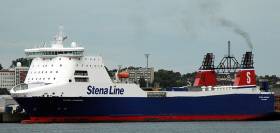Displaying items by tag: Replacement ferry
35,000 Calves Expected to Travel on Replacement Ferry to the Continent
#FerryNews - Around 35,000 calves are expected to be exported via the replacement ferry on the Rosslare-to-Cherbourg route during the four-week period that the Stena Horizon is out of action.
According to Agriland, the Minister for Agriculture, Food and the Marine, Michae Creed, confirmed that the Stena Carrier will takeover from the Stena Horizon on February 20, when it goes into dry dock for maintenance.
But, the the department added that it is difficult to predict future market developments. Further lesser numbers are also expected to be exported on the Dublin-to-Cherbourg route.
Commenting on the approval of the Stena Carrier, Minister Creed said: “Since this issue of the withdrawal of the Stena Horizon from service for routine maintenance first came to notice in October 2017, senior officials from my department have been actively engaging with all relevant stakeholders on the matter.
For more on the story, click here.
Ferry Operator Stena Still Awaiting Approval to Carry Live Cattle
#FerryNews - Ferry operator, Stena Line is still awaiting approval to carry animals for live export on the vessel that is set to replace their Ireland-France route ship Stena Horizon.
According to AgriLand which previously reported in recent weeks that Stena Line confirmed that it has chartered a vessel as a temporary replacement ship for the Stena Horizon during its planned maintenance. Afloat adds this ropax ferry operates the Rosslare-Cherbourg route.
However, meeting the necessary requirements to carry live export trucks on the replacement vessel has proved challenging.
The ferry company confirmed to AgriLand that the temporary replacement ship will start on February 20 for a period of approximately four weeks, while the Stena Horizon is in dry dock.
A spokesperson for the company continued: “Stena Line is currently working with the owners to obtain the necessary statutory vessel certifications for this highly specialist trade.
“The criteria for carriage is – naturally and correctly – extremely detailed in relation to key welfare issues such as stability, movement, ventilation etc".
To read more including a response from the president of the Irish Farmers' Association, click here.































































